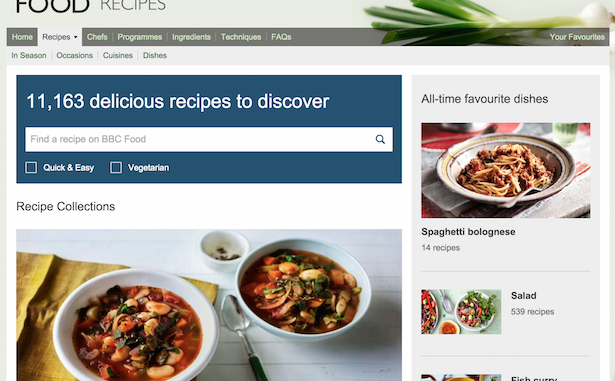
Today it was announced that the BBC Food recipe website is to close, or at least mothballed in some way.
It contains more than 11,000 recipes, many taken from the BBC’s food programming over the years and written by Rick Stein, Nigella Lawson and among others.
In short, it’s an excellent resource for home cooks which would seem to perfectly fit with Lord Reith’s original mission statement for the BBC: to ‘inform, educate and entertain’.
It seems that this decision is linked to the recent government white paper on the BBC, and the accompanying view that the corporation is over-reaching and competing with newspapers.
I’m not going to get into the politics, but I’m not convinced newspapers will benefit from the lack of a BBC recipe site.
What will happen to the BBC Food site?
Reports have suggested that the site will be closed, and that new recipes from recent TV shows will only be online for 30 days.
However, it seems more complicated than that. Instead, the BBC will not link to it, but the recipes will still be online.
2/3 Food site won’t be updated & won’t be linked to – but if you know URL for a recipe you could still go to it #bbcrecipes
— BBC Press Office (@bbcpress) May 17, 2016
This means that the recipe search feature will be offline. Indeed, it seems to be right now, as I get a 503 page when trying to search by ingredient.
Indeed, the BBC has already used the robots <META> tag to nobble the recipe search function:
This alone makes the recipe site far less useful, but the results will soon vanish from the search engines. I imagine we’ll see the same tags for the 11,000 or more pages in the site very soon.
BBC recipes and SEO performance
This will be welcome news to other sites looking to rank for recipes and related terms.
The BBC recipe site performs very well from an SEO perspective. These are the most visible sites across a range of recipe keywords.
The BBC Good Food site is run by BBC Worldwide (the beeb’s commercial arm) and is the best performing site. The BBC recipe site comes fourth after Jamie Oliver and allrecipes.co.uk.
The BBC is effective though (you can see a chart showing the terms it ranks for here) and ranks consistently well for a number of terms.
This is the result of an effective internal linking strategy, in which the BBC has been linking to hub/category pages.
You can see how this strategy works from the way searches are returning category pages like this rather than individual recipes. (Check out this article to see how Mail Online has implemented a similar hub page strategy).
This means that: a) visitors can/could see a range of cake recipes to choose from, which is more useful and b) link equity is distributed more equally and individual pages aren’t competing against each other in Google.
As for which sites will benefit, it doesn’t look to be newspapers, but rather the commercial recipe sites.
The BBC Good Food site will still dominate for now, but jamieoliver.com, allrecipes.co.uk should all be that little bit more visible. There’s also an opportunity here for the supermarkets, any of which have recipe databases.
I can’t see this benefitting newspaper’s sites so much, though The Guardian does feature in many searches. In part this is because they’re not so organised. For example, the Guardian recipe section contains a wide variety of excellent recipes, but isn’t searchable and is therefore less useful.
In summary
Whatever the reasons for and the politics behind this decision, it seems very wasteful to simply abandon such a useful resource by just de-indexing it.
As Sam Silverwood-Cope from PI Datametrics:
“People would bite your hand off (there’s probably not a recipe for that) for this depth and type of content, with all the links and page views, entire businesses have been formed on less. It would be a great shame if all these pages were just de-indexed. At least a redirect back to the main bulk of the site or to other similar pages on commercial sites would be preferable in my view.”
The sheer quality and size of the archive means we’ll see various mirror sites using this content for their own purposes. The British Library plans to archive the recipes, but they’ll also be appearing elsewhere no doubt.
Looking at the search performance, the lack of recipes pages from bbc.co.uk presents an opportunity for others. Those sites which are already established (Jamie Oliver, recipes.co.uk etc) should see their rankings and search traffic improve, while I’d expect to see more results from supermarkets for recipe searches.
That said, any recipe website with an SEO budget can learn from the things that BBC recipes did well, and benefit from its disappearance.
Source: ClickZ
Link: BBC Food website closure: what have we lost and who stands to benefit?



Leave a Reply